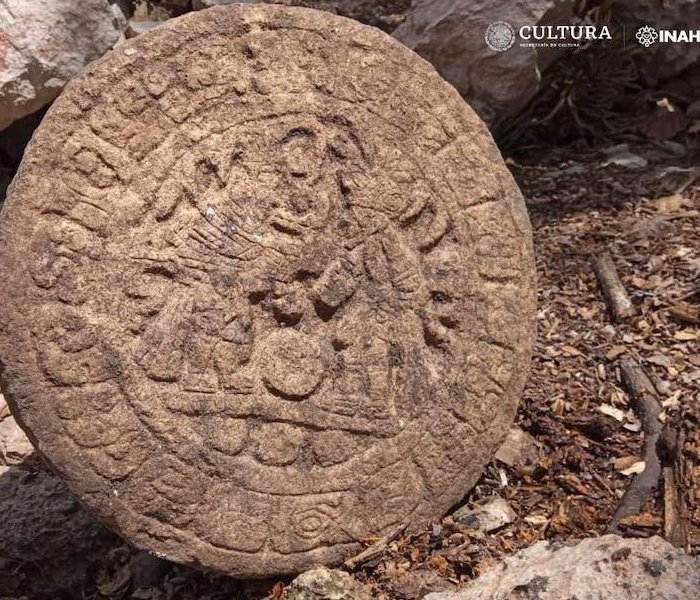Archaeologists Discover Ancient Mayan Board Game – Here’s What It Can Teach Modern Educators
AncientPages.com - Games have been played for thousands of years in cultures across the world.
There's the chequerboard game Senet, played in Egypt around BCE 3100. The African cup board game Mancala has been played since BCE 1400. Chess originated in India over 1,500 years ago. And the strategic game Go began in China 2,500 years ago.
The ball game marker discovered in Chichén Itzá. Credit: INAH
The Mayan civilization—which flourished in central America from BCE 2000 to 1500 AD—had several popular games. These games were thought to have the supernatural power to predict war. They include a cross-shaped board game called Patolli and a ball game called Pok-a-Tok.
Recently, a stone scoreboard was found by archaeologists in Chichén Itzá, Mexico's Yucatán peninsula. The Mayan people appeared to have used it to play a ritualistic game with a heavy ball.
This game held significant cultural and religious importance for the Mayan civilization. More than a simple recreational activity, it reflected the deep-rooted beliefs and values of the Mayan people. For Mayans, games provided a platform for the expression of physical abilities, the establishment of social order and the connection between the mortal and the divine.
The game discovered in Chichén Itzá symbolizes the delicate balance between light and darkness, embodying a cosmic struggle. Like other Mayan games, it was believed to influence the fate of harvests, the climate, communities and individuals.
In Mayan culture, winning a game like this was seen as a sign of divine favor. They believed that victorious people or teams had been chosen by the gods. Those who consistently lost were sometimes offered as sacrifices to the deities. Mayan games were not solely intended for entertainment, but served as ways to connect with the divine.
By participating in these games, Mayan people experienced a sense of communal identity and belonging. The rituals and beliefs associated with the games fostered a collective understanding and reinforced the connections between the physical, spiritual and social realms.
What educators can learn from ancient games
The concept of the "magic circle", introduced by Dutch historian Johan Huizinga, suggests that during games, players enter a temporary world with its own rules and boundaries.
This is exemplified in this Mayan find, which involves rules, suspension of normalcy and shared experiences.
The magic circle represents a ritual space that both transforms and builds a sense of community. Understanding of this concept can be used to promote inclusion and collaboration in modern day education. Playful experiences within game spaces can facilitate learning and create a sense of belonging, enabling students to grow and learn collectively.
Ancient rituals and games possess characteristics like repetition, structure and the use of symbolic objects that aid students in understanding the world. They also offer psychological and social benefits, fostering social bonds, reducing anxiety and improving cognitive flexibility and problem-solving skills.
Incorporating ancient and modern games in education promotes soft skills, critical thinking and inclusivity. In fostering communication, giving students agency, and crossing cultural divides, analogue games help students to understand one another better in the classroom.
Applying the lessons
The TEGA project, which we led, created a toolkit to support the development and customization of inclusive analogue games for learning, with an emphasis on accessibility.
Analogue games, like tabletop or board games, offer a tangible experience that helps teach abstract concepts which typically lack clear physical representations. Through interaction with game elements such as cards, dice and pieces, student players can grasp abstract ideas like probability and strategy more effectively than through digital games or other media.
By considering accessibility needs through their motor, sensory and cognitive dimensions, games can be designed to accommodate a wider range of students. So by incorporating board games into higher education, teachers can create a learning environments that works for all students.
Written by Sara Rye, Associate Professor, University of Bradford; Carla Sousa, Assistant professor, Lusófona University.
Provided by The Conversation
This article is republished from The Conversation under a Creative Commons license. Read the original article.
More From Ancient Pages
-
 We Dated A Sacred Aboriginal Women’s Site Used for Birthing Ceremonies And Discovered 7,000 Years Of Tool Making
Featured Stories | Jun 21, 2024
We Dated A Sacred Aboriginal Women’s Site Used for Birthing Ceremonies And Discovered 7,000 Years Of Tool Making
Featured Stories | Jun 21, 2024 -
 Creepy Story Of Lucida Mansi Who Was Obsessed With Her Beauty
Featured Stories | Jul 31, 2019
Creepy Story Of Lucida Mansi Who Was Obsessed With Her Beauty
Featured Stories | Jul 31, 2019 -
 Adorable Village Of The Little People In Connecticut
Featured Stories | Jul 25, 2019
Adorable Village Of The Little People In Connecticut
Featured Stories | Jul 25, 2019 -
 Scientists Found Mysterious Prophecies In Ancient Egyptian Pyramid – Are They Linked To The Strange Visions Some Experience Inside?
Featured Stories | Dec 17, 2024
Scientists Found Mysterious Prophecies In Ancient Egyptian Pyramid – Are They Linked To The Strange Visions Some Experience Inside?
Featured Stories | Dec 17, 2024 -
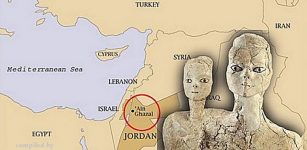 Mysterious Ancient Statues From Jordan With Millennia-Old Secrets
Civilizations | Oct 24, 2018
Mysterious Ancient Statues From Jordan With Millennia-Old Secrets
Civilizations | Oct 24, 2018 -
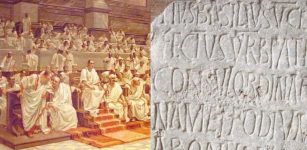 Acta Diurna: World’s First Newspaper Appeared In 131 B.C
Ancient History Facts | Jun 10, 2019
Acta Diurna: World’s First Newspaper Appeared In 131 B.C
Ancient History Facts | Jun 10, 2019 -
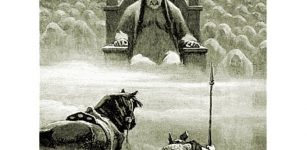 Death Of Norse God Balder And Loki’s Mischief That Led To Destruction In Ragnarok
Featured Stories | Nov 15, 2016
Death Of Norse God Balder And Loki’s Mischief That Led To Destruction In Ragnarok
Featured Stories | Nov 15, 2016 -
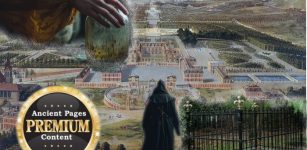 Mysterious Ancient Tomb And A Strange Vanishing In France – DNA Failed To Solve The Riddle?
Featured Stories | Feb 20, 2024
Mysterious Ancient Tomb And A Strange Vanishing In France – DNA Failed To Solve The Riddle?
Featured Stories | Feb 20, 2024 -
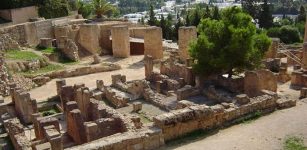 Carthage: Prosperous Phoenician Colony That Became Dominant Power In The Western Mediterranean
Featured Stories | May 21, 2020
Carthage: Prosperous Phoenician Colony That Became Dominant Power In The Western Mediterranean
Featured Stories | May 21, 2020 -
 Airmid: Irish Goddess Of Healing And Herbs And One Of The Tuatha Dé Danann
Celtic Mythology | Feb 2, 2018
Airmid: Irish Goddess Of Healing And Herbs And One Of The Tuatha Dé Danann
Celtic Mythology | Feb 2, 2018 -
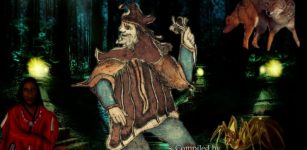 Tricksters: Mischievous Troublemakers Making Attempts To Help And Hinder In Mythologies Of Ancient Cultures
Featured Stories | Oct 28, 2019
Tricksters: Mischievous Troublemakers Making Attempts To Help And Hinder In Mythologies Of Ancient Cultures
Featured Stories | Oct 28, 2019 -
 ‘The Battle Of The Tooth Worm’ – Strange Ivory Carving
Artifacts | Aug 11, 2015
‘The Battle Of The Tooth Worm’ – Strange Ivory Carving
Artifacts | Aug 11, 2015 -
 Unusual Old Stone Map Found In The American Southwest
Featured Stories | May 9, 2024
Unusual Old Stone Map Found In The American Southwest
Featured Stories | May 9, 2024 -
 Ancient Mystery Of The American Southwest – Secrets Of The Cliff Dwellers – Part 1
Ancient Mysteries | Jul 23, 2018
Ancient Mystery Of The American Southwest – Secrets Of The Cliff Dwellers – Part 1
Ancient Mysteries | Jul 23, 2018 -
 10 Great Ancient Mysteries Of North America
Featured Stories | Sep 30, 2015
10 Great Ancient Mysteries Of North America
Featured Stories | Sep 30, 2015 -
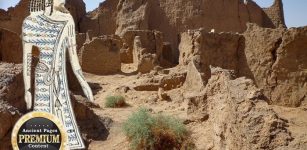 Garamantes: 3,000-Year-Old Sophisticated North African Society Built 3,000-Mile Network Of Underground Irrigation Canals
Featured Stories | Nov 10, 2025
Garamantes: 3,000-Year-Old Sophisticated North African Society Built 3,000-Mile Network Of Underground Irrigation Canals
Featured Stories | Nov 10, 2025 -
 Those Who Mysteriously Disappeared To A World Beyond Human Understanding
Featured Stories | Apr 30, 2019
Those Who Mysteriously Disappeared To A World Beyond Human Understanding
Featured Stories | Apr 30, 2019 -
 Mysterious Lost Kingdom Of Urartu And Its Enigmatic History
Featured Stories | Jul 6, 2025
Mysterious Lost Kingdom Of Urartu And Its Enigmatic History
Featured Stories | Jul 6, 2025 -
 Enigma Of The Missing Pyramid Bodies – Ancient Egyptian Mystery Remains Unsolved
Ancient Mysteries | Dec 10, 2018
Enigma Of The Missing Pyramid Bodies – Ancient Egyptian Mystery Remains Unsolved
Ancient Mysteries | Dec 10, 2018 -
 Selene – Greek Goddess Of The Moon And Myth About Love, Jealousy And Punishment
Featured Stories | Jan 24, 2019
Selene – Greek Goddess Of The Moon And Myth About Love, Jealousy And Punishment
Featured Stories | Jan 24, 2019

